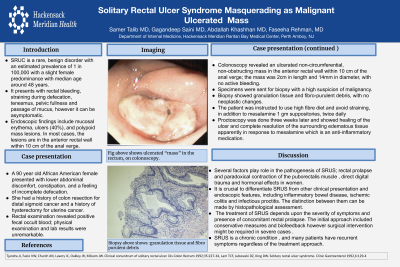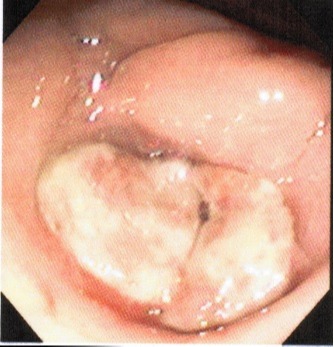Back


Poster Session C - Monday Afternoon
Category: Colon
C0126 - Solitary Rectal Ulcer Syndrome Masquerading as Malignant Ulcerated Mass
Monday, October 24, 2022
3:00 PM – 5:00 PM ET
Location: Crown Ballroom

Has Audio

Gagandeep Saini, MD
Raritan Bay Medical Center
Fresno, CA
Presenting Author(s)
Samir Talib, MD1, Mustafa Alaziz, MBBS, MS2, Abdallah Khashan, MD1, Gagandeep Saini, MD1, Faseeha Rehman, MD1
1Raritan Bay Medical Center, Perth Amboy, NJ; 2Xavier University School of Medicine, Woodbury, NY
Introduction: Solitary rectal ulcer syndrome (SRUS) is a rare benign disorder, presented with rectal bleeding, straining during defecation, tenesmus, pelvic fullness, and passage of mucus; however, it can be asymptomatic. Endoscopic findings include mucosal erythema, ulcers, and polypoid/mass lesions. In most cases, the lesions are in the anterior rectal wall within 10 cm of the anal verge.
Case Description/Methods: A 90-year-old African American female presented with lower abdominal discomfort, constipation, and feeling of incomplete defecation. She had a history of colon resection for distal sigmoid colon cancer and a history of hysterectomy for uterine cancer. Rectal examination revealed positive fecal occult blood; physical examination and lab results were unremarkable. Colonoscopy showed an ulcerated non-circumferential, non- obstructing mass in the anterior rectal wall within 10 cm of the anal verge; the mass is 2 cm in length and 14 mm in diameter, with no active bleeding. Specimens were sent for biopsy with high suspicion of malignancy. The patient was instructed to use a high fiber diet and avoid straining, in addition to mesalamine 1 gm, suppositories, twice daily. Biopsy showed granulation tissue and fibro purulent debris, with no neoplastic changes. Proctoscopy was done three weeks later and showed healing of the ulcer and complete resolution of the surrounding edematous tissue.
Discussion: Several factors play a role in the pathogenesis of SRUS; rectal prolapse and paradoxical contraction of the puborectalis muscle, direct digital trauma, and hormonal effects in women. It is crucial to differentiate SRUS from other disorders with similar clinical presentation and endoscopic features, including inflammatory bowel disease, ischemic colitis, and infectious proctitis. The distinction between them can be made by histopathological assessment. The treatment of SRUS depends upon the severity of symptoms and the presence of a concomitant rectal prolapse. The initial approach includes conservative measures and biofeedback; however, surgical intervention might be required in severe cases. SRUS is a chronic condition, and many patients have recurrent symptoms regardless of the treatment approach.
Disclosures:
Samir Talib, MD1, Mustafa Alaziz, MBBS, MS2, Abdallah Khashan, MD1, Gagandeep Saini, MD1, Faseeha Rehman, MD1. C0126 - Solitary Rectal Ulcer Syndrome Masquerading as Malignant Ulcerated Mass, ACG 2022 Annual Scientific Meeting Abstracts. Charlotte, NC: American College of Gastroenterology.
1Raritan Bay Medical Center, Perth Amboy, NJ; 2Xavier University School of Medicine, Woodbury, NY
Introduction: Solitary rectal ulcer syndrome (SRUS) is a rare benign disorder, presented with rectal bleeding, straining during defecation, tenesmus, pelvic fullness, and passage of mucus; however, it can be asymptomatic. Endoscopic findings include mucosal erythema, ulcers, and polypoid/mass lesions. In most cases, the lesions are in the anterior rectal wall within 10 cm of the anal verge.
Case Description/Methods: A 90-year-old African American female presented with lower abdominal discomfort, constipation, and feeling of incomplete defecation. She had a history of colon resection for distal sigmoid colon cancer and a history of hysterectomy for uterine cancer. Rectal examination revealed positive fecal occult blood; physical examination and lab results were unremarkable. Colonoscopy showed an ulcerated non-circumferential, non- obstructing mass in the anterior rectal wall within 10 cm of the anal verge; the mass is 2 cm in length and 14 mm in diameter, with no active bleeding. Specimens were sent for biopsy with high suspicion of malignancy. The patient was instructed to use a high fiber diet and avoid straining, in addition to mesalamine 1 gm, suppositories, twice daily. Biopsy showed granulation tissue and fibro purulent debris, with no neoplastic changes. Proctoscopy was done three weeks later and showed healing of the ulcer and complete resolution of the surrounding edematous tissue.
Discussion: Several factors play a role in the pathogenesis of SRUS; rectal prolapse and paradoxical contraction of the puborectalis muscle, direct digital trauma, and hormonal effects in women. It is crucial to differentiate SRUS from other disorders with similar clinical presentation and endoscopic features, including inflammatory bowel disease, ischemic colitis, and infectious proctitis. The distinction between them can be made by histopathological assessment. The treatment of SRUS depends upon the severity of symptoms and the presence of a concomitant rectal prolapse. The initial approach includes conservative measures and biofeedback; however, surgical intervention might be required in severe cases. SRUS is a chronic condition, and many patients have recurrent symptoms regardless of the treatment approach.

Figure: Colonoscopy showing ulcerated “mass” in the rectum
Disclosures:
Samir Talib indicated no relevant financial relationships.
Mustafa Alaziz indicated no relevant financial relationships.
Abdallah Khashan indicated no relevant financial relationships.
Gagandeep Saini indicated no relevant financial relationships.
Faseeha Rehman indicated no relevant financial relationships.
Samir Talib, MD1, Mustafa Alaziz, MBBS, MS2, Abdallah Khashan, MD1, Gagandeep Saini, MD1, Faseeha Rehman, MD1. C0126 - Solitary Rectal Ulcer Syndrome Masquerading as Malignant Ulcerated Mass, ACG 2022 Annual Scientific Meeting Abstracts. Charlotte, NC: American College of Gastroenterology.
